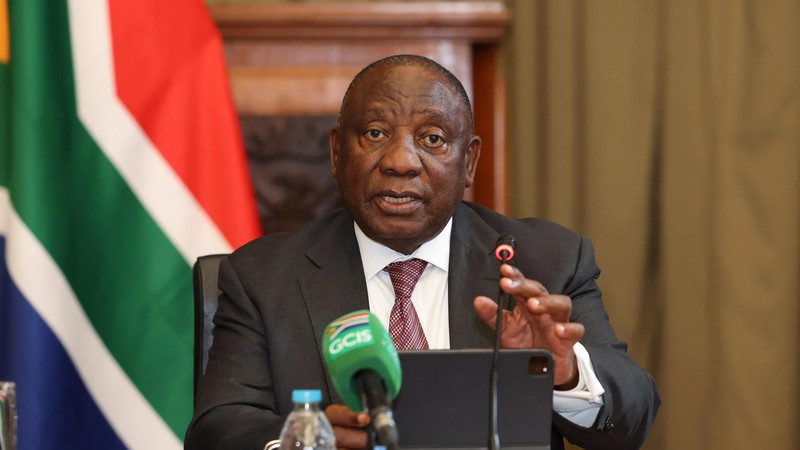President Cyril Ramaphosa has defended South Africa’s Broad-Based Black Economic Empowerment (B-BBEE) policy amid renewed calls by the Democratic Alliance (DA) to scrap it.
On Monday, the DA announced plans to introduce an Economic Inclusion for All Bill aimed at replacing the existing BEE legislation, which it criticises for primarily benefiting a politically connected elite.
Ramaphosa, however, said the DA had yet to present any formal proposals to Parliament outlining their intentions to amend or repeal BEE.
“The issue of BEE as it’s being raised by the DA, I have not yet seen their proposals,” Ramaphosa said.
“Currently we have a BEE policy, a BEE policy that is rooted and underpinned by our Constitution and the laws that we have passed. So if anyone wants an amendment to the BEE legislation, they must table their proposals, they must be taken for discussion in Parliament.”
He said the current BEE framework remains a key instrument in addressing past economic imbalances.
“At the moment the BEE policies, legislation, regulations as they stand apply without any dilution whatsoever. And we will continue to insist that the BEE process of transforming our economy is the correct approach to make sure that participation in the economy of our country is inclusive. Because hitherto it has not been inclusive, it’s been exclusive.
”It’s only been relegated to those who have benefited through privilege and many other processes from the economy that was skewed, that was only made to benefit a few white people.”
“BEE policies are meant to benefit all South Africans, said Ramaphosa.
But political analyst Siyabonga Ntombela highlighted what he calls the benefits of South Africa’s Broad-Based Black Economic Empowerment (B-BBEE) policy, noting that it has enabled some black individuals to gain entry into previously white-owned companies.
However, he warned that the system largely benefits a politically connected few rather than the wider black population it was meant to empower.
Ntombela said the policy’s implementation has resulted in a small group of individuals becoming wealthy through partnerships with established white-owned companies.
“The benefits of B-BBEE is that a handful of black politically connected individuals have become directors and partners in previously white-owned companies. By so doing, they have assisted these companies to secure lucrative government contracts,” he said.
He argued that the system encourages tokenism rather than genuine empowerment, as companies use black partners mainly to access state tenders.
According to Ntombela, the more black faces a company has on its board, the greater its chances of winning government business.
While acknowledging that B-BBEE was intended to open doors for previously disadvantaged South Africans, Ntombela said the policy has failed to reach those most in need. “Each day we notice that it is usually the relatives of the politicians who are benefiting,” he added.
He warned that the lack of inclusivity and the dominance of politically connected beneficiaries have fuelled public resentment towards the policy.
Ntombela further noted that many white-owned companies continue to resist meaningful transformation, choosing instead to maintain control while co-opting black individuals for appearance’s sake.
Speaking on the sidelines of a bilateral meeting between the ANC officials and COSATU in Braamfontein, both parties firmly rejected the DA’s call to repeal BEE legislation.
ANC spokesperson Mahlengi Bhengu-Motsiri said transformation laws were non-negotiable. “There will not be a day in South Africa where BEE is scrapped as a legislation,” she said, adding that while amendments may be considered, they must not alter the core intent of the law.
“Where there are amendments, I’m certain that like any other piece of legislation, amendments are acceptable for as long as they do not deviate from the substance of that piece of legislation.”
She criticised the DA for boycotting the national dialogue process.
“If the DA was sincere about its intentions, they would be part of the national dialogue process,” she said.
“The idea of a future South Africa without transformation legislation must be challenged by all democracy-loving people and patriots,many of whom are beneficiaries of the policy.”
Defending BEE’s impact, Bhengu-Motsiri pointed to increased representation of black professionals and women, particularly in the public sector. She dismissed claims that only ANC-linked individuals benefit from BEE.
“I’m not certain what the evidence is,” she said. “I’m not certain that public servants are members of the ANC.”
Bhengu-Motsiri also criticised DA federal chairperson Helen Zille for her comment suggesting that Afrikaners pulled themselves up “by their bootstraps.”“That posture is really quite disappointing,” she said.
“It seeks to take South Africa back to racism and to apartheid and discrimination. It reflects the dismissiveness with which parties and other right-wing groups in South Africa treat the need for transformation.”
She said defending and improving BEE was a generational and historical responsibility: “To protect what has been fought for and to also undo some of the things that have not worked.”
COSATU’s Parliamentary Coordinator Matthew Parks supported the ANC’s position, stating that BEE and employment equity laws remain essential for addressing historical injustices.
“Transformation legislation didn’t fall from the sky,” he said.
“When we have reached an equal society, you can have that discussion. But for the time being, we need it.”
He rejected the idea that BEE only benefits the elite. “Often, people assume BEE is about a few wealthy individuals. It’s not. It’s about providing an inclusive approach to everybody, women, including white women, people with disabilities, black persons, etc.”
He noted that more than half a million workers had benefited through employee shareholding schemes.
Politics
